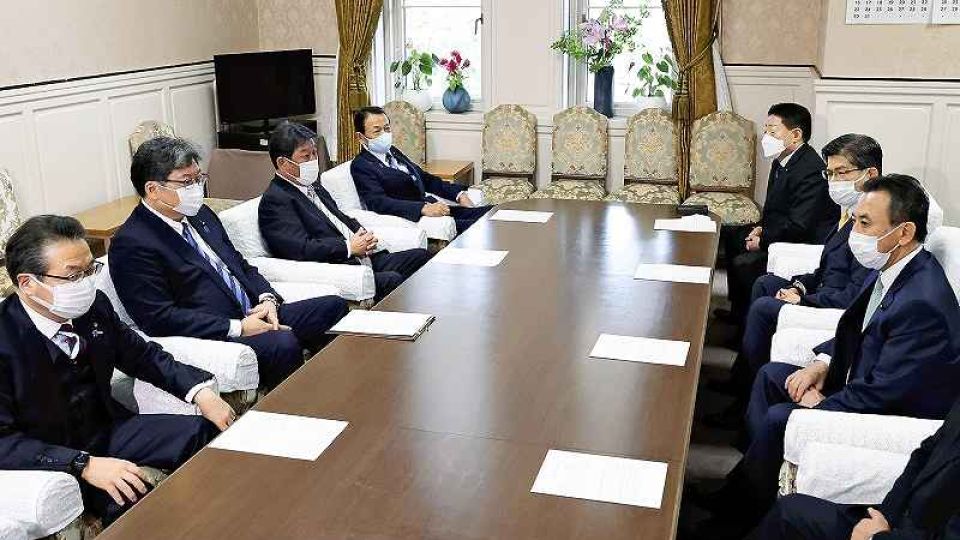October 20, 2022
TOKYO – Defining “counterattack capabilities” will be the focus of the ruling parties’ discussions on revising the government’s three national security-related documents, including the National Security Strategy.
The Liberal Democratic Party wants to maximize deterrence through the flexible application of these capabilities. However, Komeito is calling for restrained use under certain restrictions, and the LDP is showing consideration for its coalition partner as it seeks a middle ground.
Lending authority
“This is an important issue, so we’ve made arrangements to share responsibility as the ruling parties.” So said Koichi Hagiuda, chairman of the LDP’s Policy Research Council, after attending the first meeting of the ruling parties’ council on foreign affairs and national security at the Diet Building on Tuesday.
The council includes such powerful figures as LDP Vice President Taro Aso and Secretary General Toshimitsu Motegi, and Komeito Deputy Chief Representative Kazuo Kitagawa and Secretary General Keiichi Ishii.
Since the outcome of the discussions is highly likely to lead to a historic shift in Japan’s defense policy, including the possession of counterattack capabilities, these high-ranking representatives have been chosen to “lend strong authority to the agreement,” according to a senior official of Komeito.
However, the first meeting ended in only about 15 minutes, with no concrete discussions taking place. Substantive talks are being left to a working team established under the council, which will consist mainly of mid-career and young legislators involved in national defense issues.
Initially, the LDP sought to hold discussions only among the working-level members of the team, saying that “specialized discussions should be left to those who are involved with national security.” Komeito, however, asked for higher-level talks. Therefore, the establishment of the council itself can be viewed as an indication that the LDP is showing consideration for Komeito.
Scope of coverage
The biggest difference between the two parties regarding counterattack capabilities is how to interpret the concept of “beginning an attack.”
The government’s view is that the use of force in the event of an enemy beginning an attack is not a preemptive strike prohibited by international law. However, there are difficulties in determining when an enemy attack has been put in motion. Recently there have been fewer signs such as liquid fuel being injected at launch bases, and missiles have been sent off from mobile launch vehicles and underwater launching systems. Solid fuel is also being used.
The LDP believes that restricting the definition of “beginning an attack” will undermine deterrence, and is reluctant to specify the criteria for such judgments. “It would show our cards [to the enemy],” Itsunori Onodera, chairman of the LDP’s Research Commission on National Security, said on an NHK TV program on Sunday.
On the same program, Shigeki Sato, chairman of Komeito’s Research Commission on Foreign Affairs and National Security, said, “Without strict fact-finding, Japan will be criticized for attacking at an ambiguous stage.” Onodera and Sato are both their party’s representatives of the working team.
Sato called for criteria so that Japan would not be wrongly thought to be making preemptive strikes.
Regarding possible targets of Japanese counterattacks, the LDP envisions including “command and control functions” such as headquarters. Within Komeito, however, there is a strong insistence on limiting such targets to the minimum scope required.
Applying the brakes
Komeito has seen itself as the one “putting the brakes” on the government and the LDP over security policy. In the 2014 cabinet decision to approve limited exercise of the right of collective self-defense, Komeito took the lead in stipulating that the use of this right would be limited to cases in which the people’s rights might be “fundamentally overturned.”
In the wake of Russia’s invasion of Ukraine and the escalating tensions around Taiwan, the need to strengthen Japan’s defense capabilities is increasingly acknowledged even among those who support Komeito.
But Komeito strongly believes that its raison d’etre lies in curbing to some extent the build-up of the nation’s defense capabilities.
On the LDP side, some argue that considering the worsening security environment, top priority should be placed on enhancing deterrence, avoiding easy compromises.
The two parties will seek to find a point of compromise through careful discussions.

